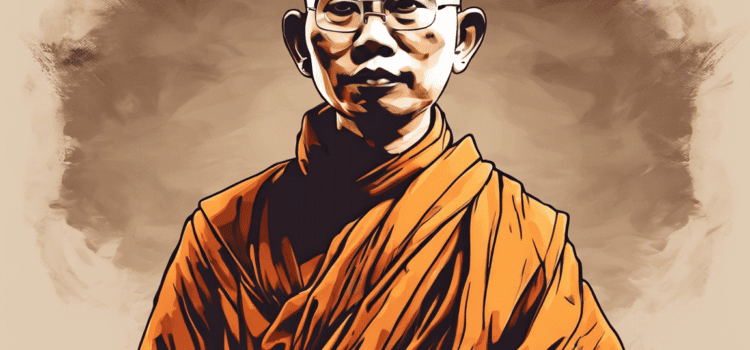Introduction
In recent times, a video of a Buddhist monk engaging in political activities has sparked a wave of discussions and controversies. The intersection of religion and politics is a sensitive topic that often raises questions about ethics, boundaries, and the role of spiritual leaders in society. This article aims to delve into the insights and controversies surrounding the involvement of a Buddhist monk in politics, analyzing the implications and potential consequences of such actions.
The Role of a Buddhist Monk
Buddhist monks are revered for their spiritual practice, dedication to the teachings of Buddha, and commitment to leading a life of simplicity and mindfulness. Their primary goal is to attain enlightenment and guide others on the path to spiritual growth and liberation from suffering. Monks are traditionally seen as neutral figures, detached from worldly concerns and political engagements. Their role is to cultivate compassion, wisdom, and inner peace, serving as moral beacons for their communities.
Insights on the Monk’s Political Involvement
The video showing a Buddhist monk engaging in political activities has raised questions about the boundaries between spirituality and politics. Some may argue that monks have a moral obligation to speak out against injustice, corruption, and oppression, using their influence for the greater good of society. In this view, the monk’s involvement in politics can be seen as a courageous stand against wrongdoing and a call for social change.
Moreover, the teachings of Buddha emphasize the importance of compassion, justice, and equality, values that resonate with many political struggles around the world. By participating in political activities, the monk may seek to uphold these core principles and address systemic issues that perpetuate suffering and inequality. In this sense, the monk’s actions can be viewed as an extension of his spiritual practice, aimed at promoting social harmony and well-being.
Controversies Surrounding the Monk’s Actions
On the other hand, the involvement of a Buddhist monk in politics has sparked controversies within the religious community and beyond. Critics argue that monks should remain apolitical and focus solely on their spiritual duties, avoiding entanglements in partisan conflicts and power struggles. Engaging in politics, they claim, could tarnish the monk’s reputation, compromise his moral authority, and sow division among followers.
Furthermore, the separation of church and state is a fundamental principle in many societies, aimed at preserving the autonomy of religious institutions and preventing undue influence on governmental affairs. The monk’s foray into politics may be perceived as a violation of this principle, blurring the lines between spiritual leadership and political activism. Such actions could lead to tensions with authorities, legal repercussions, and conflicts with other religious groups.
Implications of the Monk’s Political Engagement
The video of the Buddhist monk’s political activities raises broader questions about the role of religion in public life and the ethical responsibilities of spiritual leaders. While some may see political engagement as a form of social advocacy and moral leadership, others caution against the risks of mixing spiritual authority with partisan agendas. The monk’s actions could have far-reaching implications for the reputation of the Buddhist community, the credibility of spiritual institutions, and the delicate balance between faith and governance.
Moreover, the controversy surrounding the monk’s political involvement highlights the challenges of navigating complex moral dilemmas in a rapidly changing world. As societies grapple with pressing issues such as social inequality, environmental degradation, and human rights violations, the role of religious figures in shaping public discourse and advocating for change becomes increasingly significant. Finding a balance between spiritual values and social responsibilities is a delicate task that requires wisdom, discernment, and a deep understanding of ethical principles.
Frequently Asked Questions (FAQs)
- Is it common for Buddhist monks to engage in politics?
-
While the traditional role of Buddhist monks emphasizes spiritual practice and detachment from worldly affairs, there have been instances of monks participating in political activities, especially in response to social injustices or ethical concerns.
-
What are the potential consequences of a monk’s involvement in politics?
-
The monk’s political engagement could lead to conflicts within the religious community, challenges to the autonomy of spiritual institutions, and tensions with governmental authorities. It may also affect the monk’s reputation and moral authority.
-
How do Buddhist teachings inform the debate on monks in politics?
-
Buddhist teachings emphasize compassion, justice, and ethical conduct, values that can inspire monks to advocate for social change and address systemic issues. However, the interpretation of these teachings in the context of politics is a subject of ongoing debate.
-
What ethical considerations should monks take into account when engaging in politics?
-
Monks should reflect on the potential impact of their actions on their spiritual practice, the Buddhist community, and society at large. They should consider principles of non-violence, honesty, and integrity in navigating political engagements.
-
How do followers of Buddhism respond to monks involved in politics?
- Responses to monks in politics vary among followers of Buddhism, with some supporting their advocacy for social causes and others expressing concerns about the implications for the integrity of the monastic tradition. Dialogue and ethical reflection are essential in addressing these divergent views.
In conclusion, the video of a Buddhist monk politician has sparked a nuanced debate on the intersection of spirituality and politics, raising important questions about ethical conduct, moral leadership, and the role of religious figures in society. While the monk’s actions have drawn both support and criticism, they underscore the complexities of navigating moral dilemmas and advocating for social change in a rapidly evolving world. Finding a delicate balance between spiritual values and social responsibilities is a profound challenge that requires deep reflection, ethical discernment, and a commitment to upholding the core principles of compassion, justice, and wisdom.

